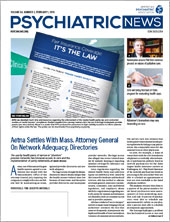The number of mobile health care apps is growing at a rapid pace. Recent estimates suggest there are now over 300,000 health apps available to download. This list includes more than 10,000 mobile apps related to mental health, including screening tools that assess mood, trackers that help people monitor their daily symptoms, and mindfulness-based activities to promote relaxation and wellness.
The Food and Drug Administration’s ability to regulate the products in this vast and quickly evolving space using traditional models has proven challenging. In response, the agency is looking to shift its oversight of individual apps to the companies that make them.
While such a model could enable trusted firms to quickly bring evidence-based medical apps to market, some groups—including APA— are concerned that this approach will benefit companies more than patients.
Pre-Cert Could Streamline App Review
The new FDA model is called the Software Precertification Pilot Program, or Pre-Cert. According to the FDA, companies that demonstrate “a robust culture of quality and organizational excellence and are committed to monitoring real-world performance of their products once they reach the U.S. market” will be “pre-certified” and given a fast and streamlined review process for all their digital health products.
These “pre-certified” companies will then be responsible for monitoring the effectiveness and user satisfaction of their products and providing periodic reports to the FDA.
The FDA spent 2018 hashing out the basic framework of the pre-certification process, which they refer to as Pre-Cert 1.0. The first real-world test of the program is occurring this year.
Nine companies have been selected to participate in the pilot and work toward Pre-Cert status. One of the companies involved is Pear Therapeutics, which has two FDA-cleared digital therapeutics: ReSET and ReSET-O. These prescription-only mobile applications are meant to be used in conjunction with standard outpatient treatments for alcohol, cocaine, marijuana, and/or stimulant use disorder (ReSET) or opioid use disorder (ReSET-O). Other participating companies include Apple, FitBit, Johnson & Johnson, and Roche.
Will Pre-Cert Benefit Patients?
John Torous, M.D., co-director of the Digital Psychiatry Program at Beth Israel Deaconess Medical Center in Boston and a member of APA’s Committee on Mental Health Information Technology (MHIT), said he appreciates the FDA’s effort to “think outside the box.”
Historically, the agency has taken a hands-off approach to most mobile health apps; the FDA actively regulates only those apps that meet the agency’s definition of a “medical device,” as defined in the federal Food, Drug, and Cosmetic Act. To be considered a medical device, a mobile app must claim that it can diagnose, prevent, treat, cure, or mitigate a disease or condition.
In some cases, an app can be easily categorized as a medical device; an app that turns a phone into a blood sugar meter so that people can monitor their diabetes, for example, serves a clear medical function. But, as Torous explained to Psychiatric News, most mental health apps “fall into a gray area.” Apps such as Moodkit and Happify, for instance, provide tools for people to track and manage their mood symptoms, but because these apps don’t make specific medical claims, they are exempt from FDA oversight.
While some app developers have put their mental health apps through rigorous clinical testing and review, many have not, Torous said.
With the Pre-Cert option, more companies might be willing to develop apps that meet FDA quality standards for medical devices. However, Torous and other MHIT committee members are concerned that the Pre-Cert model, as currently described, shifts too much regulatory oversight to the companies.
“It would be nice if the FDA had a clearer partnership with physician and patient groups,” Torous told Psychiatric News. “The criticism today is that industry seems to be driving the ship.” APA Committee Calls for Transparency.
In October 2018, Torous and other MHIT committee members composed an official letter on behalf of APA that voiced these concerns. One of the concerns noted in the letter was that the Pre-Cert program does not require any pre-market evaluations to see if the apps can improve health outcomes. Rather, safety and effectiveness will be gauged through postmarketing surveillance done by companies themselves.
In the letter, Torous and the members of the committee urged the FDA to ensure transparency during both the certification process and during product surveillance.
A lack of transparency could jeopardize patient safety, the group wrote. This “is especially troubling considering that patients who utilize some of these apps by pre-certified vendors will be diagnosed with substance use disorders, mood disorders, and other mental health conditions that place them at risk for self-injurious behavior, suicidality, and overdose.”
They added, “Medical specialty societies, like APA, can offer the FDA and participating vendors a wealth of guidance in this process, including expertise in measurement-based care, clinical content resources (e.g., clinical practice guidelines), and member experts.”
APA has not been the only group to voice concern about Pre-Cert. Industry groups (for example, the Medical Imaging and Technology Alliance) issued statements questioning whether the FDA has the authority to place mobile apps in a new regulatory category without congressional approval. They also noted the current model has not yet provided details on how companies that fail to meet standards lose certification status. ■

